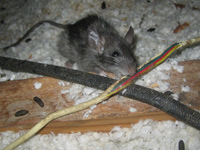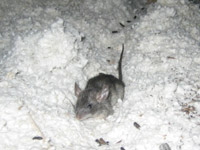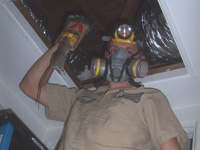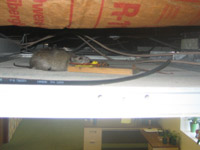
A rat in a ceiling, chewing on wires. |
|

Here's a rat running through the
ceiling. |
Rats commonly live in the ceiling. You may hear
them scurrying around at night, running from one
part of the ceiling to the other. They love to
live inside buildings. Most people hear them at
night, when they are active, scuttling about
inside the ceiling or in the walls. If you hear
rats high up in the ceiling, it is probably the
Roof Rat (Black Rat) as opposed to the Norway
Rat (Brown Rat). In fact, depending on the
architecture of your house, the rats are
probably in the attic, which of course is the
open space above your ceiling. However, they can
fit in very small areas, and I've dealt with
many cases of rats running in between floors.
I've had to cut many dead rats out of ceilings
between the first and second floor. In addition,
I often do rat control in office buildings,
doctor's offices, etc in the drop ceiling. I pop
open the tiles and that's where I catch the
rats.

Coming out of the ceiling with a rat. |
|

A rat trapped in a drop-ceiling. |
As shown in the top two photos, there's more to
it than just the troubling noise at night. Rats
can chew on electrical wires, which can lead to
shorts or even electrical fires in attics. Then
there's the matter of the droppings and the
disease that they spread. Best to have the
problem taken care of before it gets worse.

For more rat control and trapping information,
go back to the
how to
get rid of rats.
If you don't live in
Orlando FL, click here for the National
Directory of Rat Trappers.
I also have a lot of information on rodent
control - rat and mouse control, on these pages:
Noises in the
ceiling at night
How to get rats out
of the garage
Do rodents like rats
and mice feel pain?
What does rat
feces look like? Where is it found?
Do rodents eat
insects?
Do rats eat cheese?
Do they like it?
Do dogs keep rats and
mice away?
Do rats dig holes?
Do rats destroy
insulation in the attic?
Will a rat chew
through the ceiling?
Do cats keep rats and
mice away?
Can rats swim?
Do rats have bones? How
can they fit in such small holes?
What if you are bitten
by a rat
Do rats bite sleeping
babies?
How to get a rat
out of your bedroom
What attracts rats?
Mouse or rat droppings in ceiling tiles - Care
should be taken when you find rat or mouse
droppings above a ceiling tile. With most rodent
infestation, it is highly recommended that any
soiled areas be thoroughly cleaned or removed.
If the tile has staining that cannot be removed,
you should assume that the tile also is giving
off pheromones, chemical attractants for other
rats or mice. Pheromones are the main
reason—aside from health concerns—to clean up
after a rodent issue. Any waste that is left
behind by the mice has the potential to lure in
new mice. Do not try to salvage the ceiling tile
if it cannot be completely cleaned. That being
said, before you attempt cleanup, remember that
mouse droppings will expose you to a world of
zoonotic diseases, some of which can be fatal to
humans. Proper protective gear should be worn
when dealing with this type of mess. Gloves are
very important, and you should not undervalue
the importance of a respirator mask. Even though
you cannot see them, there are thousands of dust
particles in the air, some that have been shed
from the droppings. If these particles contain
something deadly, like Hantavirus, then you had
better hope you are wearing that mask.
Rodent ceiling scratching Any rodent, be it
mouse or rat in the ceiling, will be driven to
scratching; however, the sounds you hear
overhead are most likely from that animal
chewing on important parts of your home. A lot
of people ignore mice; this should not be the
case. It is true that many homes in rural areas
have a miniscule rodent issue, but it is not
something that should be ignored because it is
common-place. Mice will cause serious damage
inside of a home. These little animals can chew
on electrical cords and start house fires. The
rate at which a mouse chews through substances
is not slow. They may be small, but mice are
chewing machines. Ignoring the issue will only
make the damage more significant when you are
forced to eventually deal with the infestation.
Ceiling scratching means that animals have
infiltrated the home somehow. That area in the
exterior of the building needs to be located and
repaired. Until this step happens, more mice
will enter the home even if you are currently
utilizing trapping methods.